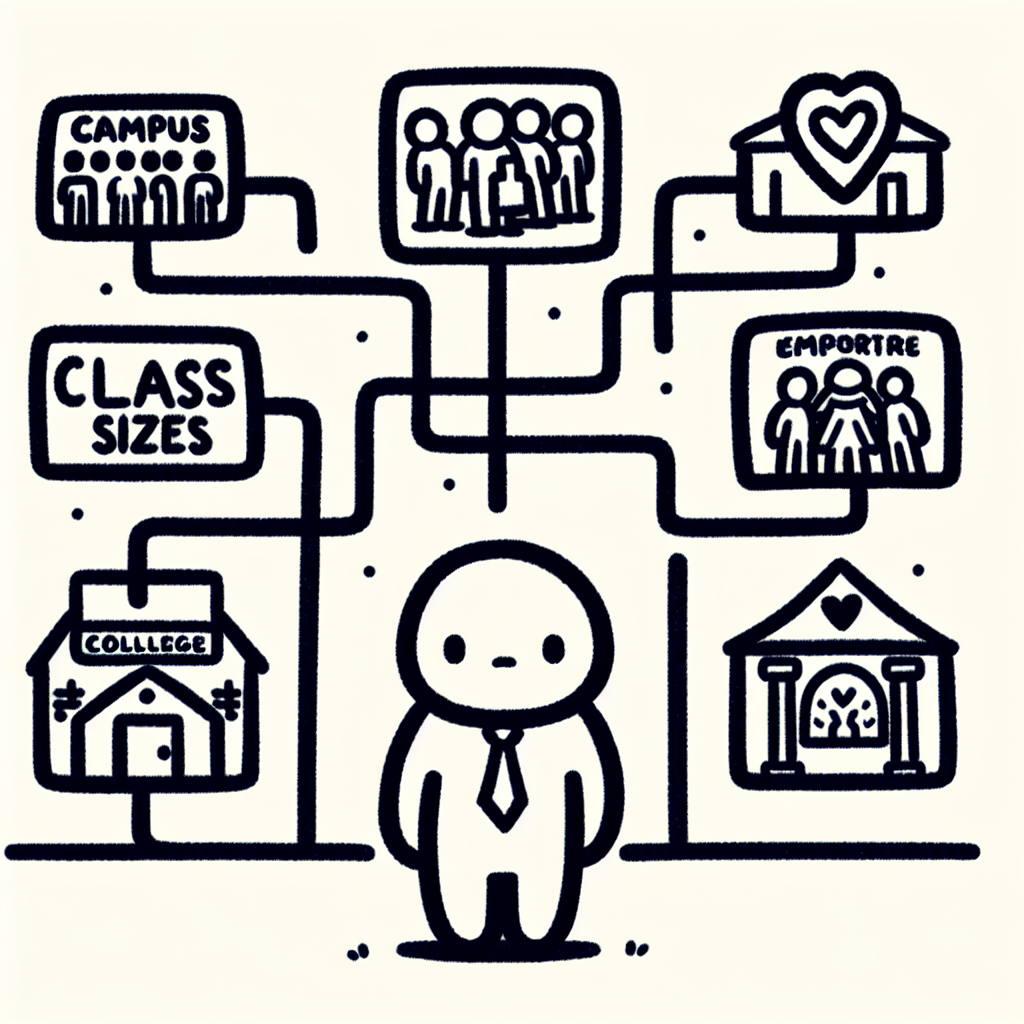Introduction
When it comes to choosing the right college fit, many students and families focus heavily on rankings and prestige. However, the highest-ranked college isn't always the best match for every student. Finding a college that aligns with your personal goals, learning style, and values often leads to greater satisfaction and success in the long run.
The college environment plays a significant role in shaping your academic performance, mental health, and career opportunities. A mismatch can lead to disengagement, poor grades, or even dropping out, while the right fit can foster growth, connection, and achievement.
That's why it's essential to take a holistic and individualized approach when evaluating colleges. Factors such as campus culture, class sizes, support services, and extracurricular opportunities all contribute to making a college the right fit—not just its name or ranking.

Rethinking College Rankings
Why Rankings Can Be Misleading
When choosing the right college fit, many students and families turn to national rankings as a primary guide. However, these rankings often emphasize factors that do not directly impact a student's day-to-day experience. Metrics such as endowment size, alumni donations, and faculty awards may boost a school's prestige but offer little insight into campus culture, classroom engagement, or student satisfaction.
According to Stanford research, student success is more closely linked to how engaged a student is with their learning and campus community, rather than the college's ranking. This suggests that placing too much weight on rankings may lead students away from institutions where they could thrive academically and personally.
Common Misconceptions About Top Institutions
There is a widespread belief that attending a highly ranked or prestigious college guarantees better outcomes. In reality, prestige does not ensure happiness, academic success, or career fulfillment. Emotional well-being, access to academic support, and a strong sense of community often play a more significant role in a student's college experience and long-term success.
When choosing the right college fit, it's important to look beyond name recognition and consider whether a school aligns with individual goals, learning styles, and personal needs. A less well-known institution may offer stronger mentorship, better mental health resources, or a more supportive academic environment—all of which are crucial for student success.

Defining Your Personal Fit
Academic Alignment
When choosing the right college fit, it's essential to begin with academic alignment. Start by evaluating whether the college offers strong programs in your intended major or academic interest. Some institutions have nationally recognized departments or unique curricular offerings that can significantly enhance your educational experience. Look into faculty expertise—are there professors conducting research or publishing in areas you're passionate about? Are there opportunities for undergraduates to assist in research or engage with faculty outside the classroom? These factors can directly impact the depth and quality of your academic development (Concordia University Chicago).
Campus Culture and Environment
The physical and social environment of a college can also influence your success and satisfaction. Consider whether you prefer a small liberal arts college or a large public university. Each offers distinct learning environments and community interactions. Urban campuses may provide access to internships and cultural experiences, while rural settings might offer a quieter, close-knit community. Diversity, inclusivity, and the college’s community values are other critical components. Investigate how the school supports various identities and whether students from different backgrounds feel welcomed. Additional aspects like campus safety, student involvement, and housing options also contribute to the overall environment and should align with your personal preferences (St. Norbert College).
Emotional and Social Fit
Feeling emotionally supported and socially connected plays a major role in your college experience. Look into the range of student clubs, organizations, and extracurricular activities offered. These can be key to forging friendships and building a sense of community. Support systems such as mental health resources, academic advising, and mentorship programs are equally important. According to Stanford research, students thrive when they feel they belong—more so than when they simply attend a highly ranked institution. Ensuring that the college fosters a welcoming environment where you can see yourself growing is crucial when choosing the right college fit.

Financial Considerations
When choosing the right college fit, financial factors play a critical role in the decision-making process. Understanding the true cost, available aid, and long-term value can help students and families make informed choices.
Total Cost of Attendance
The total cost of attendance goes beyond just tuition. It includes fees, housing, meals, textbooks, transportation, and personal expenses. Colleges often advertise a "sticker price," but the actual amount a student pays—known as the "net price"—can be significantly lower after accounting for financial aid. It's important to review detailed cost breakdowns to understand what you’ll actually be expected to pay.
Financial Aid and Scholarships
Financial aid packages can vary widely, so it’s important to compare not only the total award amounts but also the types of aid offered. Grants and scholarships reduce costs directly, while loans must be repaid. As noted by Azusa Pacific University, families should look closely at the structure of aid packages to assess their true value.
Work-study programs and on-campus employment opportunities can also offset costs and provide valuable experience. These options should be considered part of the overall financial picture.
Return on Investment (ROI)
Evaluating the potential return on investment is essential when choosing the right college fit. This includes considering post-graduation salaries, employment rates, and career placement services. As highlighted by Florida National University, aligning your college choice with your long-term career and financial goals ensures that the investment in education pays off over time. ROI should be a guiding factor in selecting a college that meets both academic and financial expectations.

Academic and Career Support
When choosing the right college fit, it's essential to evaluate the academic and career support services that will shape your educational and professional journey.
Program Flexibility and Format
Colleges today offer a range of program formats, including online, hybrid, and traditional in-person options. This flexibility can be crucial for students balancing other commitments or preferring specific learning environments. Additionally, institutions that allow students to double-major or pursue minors provide valuable opportunities to expand skillsets and explore multiple interests. For example, Concordia University Chicago emphasizes the importance of flexible program structures as a factor in choosing the right college fit.
Career Services and Internships
Strong career services are a key component of choosing the right college fit. Look for schools that offer robust job placement support, including resume workshops, interview preparation, and career counseling. Partnerships with industry leaders and access to internships can also create meaningful pathways to employment after graduation. These services help bridge the gap between academic experiences and real-world career opportunities.
Alumni Network
The strength and engagement of a college's alumni network can significantly influence your career prospects. An active alumni community can provide mentorship, job referrals, and valuable industry insights. When choosing the right college fit, consider how involved alumni are in supporting current students and whether the school facilitates connections through networking events, online platforms, or formal mentorship programs.

Steps to Making a Confident Decision
Research and Campus Visits
One of the most effective ways to narrow down your options when choosing the right college fit is to experience campuses firsthand. Schedule campus visits, attend open houses, and talk to current students to get a feel for the environment and culture. According to Azusa Pacific University, these steps can provide valuable insight into daily life at each school and help you determine whether a college matches your preferences and expectations.
Talk With Advisors and Family
Seeking guidance from counselors, mentors, and family members can offer new perspectives and help you weigh both practical and emotional considerations. These conversations can clarify priorities such as financial planning, academic programs, and location. Including trusted voices in the decision-making process can lead to a more informed and confident choice.
Reflect on Your Values and Goals
When choosing the right college fit, take time to reflect on your personal values and long-term goals. Create a shortlist of colleges that align with your academic interests, desired campus culture, and life after graduation. Consider how each school supports your aspirations for personal development and career readiness. This self-assessment is key to selecting a college where you can thrive both academically and personally.

Special Considerations
For First-Generation or Underrepresented Students
When choosing the right college fit, first-generation or underrepresented students should explore whether schools offer tailored support programs like mentorship, academic assistance, or first-year experience initiatives. Some colleges have dedicated offices or centers that focus on creating an inclusive environment and promoting equity. It is also important to assess cultural competency by researching student organizations, multicultural events, and the diversity of faculty and staff. Campus visits or virtual tours can provide insight into how welcoming and inclusive a college environment truly is.
For Students with Specific Needs (e.g., Athletes, Artists, STEM Majors)
Students with specialized interests should prioritize schools that cater to their needs through niche programs and facilities. Athletes may look for schools with strong athletic departments, training resources, and flexible academic schedules. Artists might focus on access to studios, performance spaces, and exhibition opportunities. STEM majors should consider research facilities, lab access, and faculty mentorship opportunities. Choosing the right college fit involves ensuring that the institution supports and enhances a student’s specific talents and goals.
For High School Students Starting Early
High school students beginning the college search process should start by identifying their interests, participating in extracurricular activities, and reflecting on what they want from a college experience. According to St. Norbert College, starting early allows students to gain clarity on their goals and values, helping them make informed choices later. By exploring different types of colleges and campus environments now, students can better understand what constitutes the right college fit for them.

Conclusion
Choosing the right college fit is about more than prestige or rankings—it's about finding a place where you can thrive. The right fit maximizes your engagement in academics, supports your personal development, and sets the foundation for long-term success. Instead of focusing solely on external metrics, evaluate how well a school aligns with your academic interests, emotional needs, and social preferences. Taking a holistic approach allows you to choose a college that reflects who you are and supports who you want to become. Ultimately, the best college is the one where you can grow, contribute, and succeed on your own terms.

Recommended Resources
When it comes to choosing the right college fit, using reliable resources can help students make more informed decisions. The following articles and guides offer a range of perspectives and practical advice:
- Stanford Research: Ignore Rankings — This article emphasizes the importance of looking beyond college rankings. It suggests students focus on personal fit rather than prestige to find the right environment for success.
- Azusa Pacific University: 6 Tips for Narrowing Choices — APU provides actionable steps for narrowing down options, such as identifying academic interests, considering location, and evaluating campus culture.
- Concordia University Chicago: Key Fit Factors — This resource outlines major factors to consider when choosing the right college fit, including class size, extracurricular opportunities, and faculty accessibility.
- Florida National University: Career and Finance Focus — FNU highlights how career goals and financial planning should play a central role in the college decision process.
- St. Norbert College: Early Considerations for Fit — This guide encourages students to begin thinking about fit early in the college search and offers questions to help shape their priorities.
These resources support a thoughtful, individualized approach to choosing the right college fit, helping students align their choices with both personal and academic goals.







.png)






